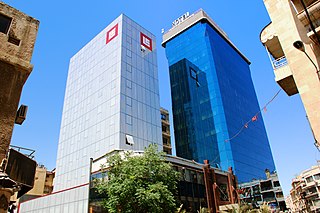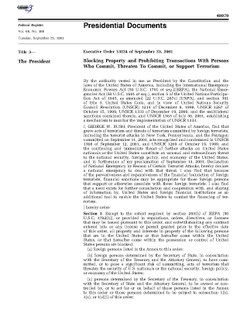Related Research Articles

Syria's economic situation has been turbulent and has deteriorated considerably since the beginning of the Syrian war, which erupted in March 2011.

The Cuban Liberty and Democratic Solidarity (Libertad) Act of 1996, Pub.L. 104–114 (text)(PDF), 110 Stat. 785, 22 U.S.C. §§ 6021–6091) is a United States federal law which strengthens and continues the United States embargo against Cuba. It extended the territorial application of the initial embargo to apply to foreign companies trading with Cuba, and penalized foreign companies allegedly "trafficking" in property formerly owned by U.S. citizens but confiscated by Cuba after the Cuban revolution. It also covers property formerly owned by Cubans who have since become U.S. citizens.

Non-tariff barriers to trade are trade barriers that restrict imports or exports of goods or services through mechanisms other than the simple imposition of tariffs.

The United States embargo against Cuba prevents American businesses, and businesses organized under U.S. law or majority-owned by American citizens, from conducting trade with Cuban interests. It is the most enduring trade embargo in modern history. The US first imposed an embargo on the sale of arms to Cuba on March 14, 1958, during the Fulgencio Batista regime. Again on October 19, 1960, almost two years after the Cuban Revolution had led to the deposition of the Batista regime, the US placed an embargo on exports to Cuba except for food and medicine after Cuba nationalized the US-owned Cuban oil refineries without compensation. On February 7, 1962, the embargo was extended to include almost all exports. The United Nations General Assembly has passed a resolution every year since 1992 demanding the end of the US economic embargo on Cuba, with the US and Israel being the only nations to consistently vote against the resolutions.

Executive Order 13224 is an executive order issued by U.S. President George W. Bush on September 23, 2001, as a response to the attacks on September 11, 2001. It has been renewed every year since.
The Foreign Agricultural Service (FAS) is the foreign affairs agency with primary responsibility for the United States Department of Agriculture's (USDA) overseas programs — market development, international trade agreements and negotiations, and the collection of statistics and market information. It also administers the USDA's export credit guarantee and food aid programs and helps increase income and food availability in developing nations by mobilizing expertise for agriculturally led economic growth. The FAS mission statement reads, "Linking U.S. agriculture to the world to enhance export opportunities and global food security," and its motto is "Linking U.S. Agriculture to the World."

After the failure of the Embargo Act of 1807, the federal government of the United States took little interest in imposing embargoes and economic sanctions against foreign countries until the 20th century. United States trade policy was entirely a matter of economic policy. After World War I, interest revived. President Woodrow Wilson promoted such sanctions as a method for the League of Nations to enforce peace. However, he failed to bring the United States into the League and the US did not join the 1935 League sanctions against Italy. However, in 1940, the United States participated in the ABCD line against Japan, and the Helium Act of 1925 forbade the export of that strategic commodity. Interest in trade as a tool of foreign policy expanded during the Cold War era, and many economic sanctions were applied. The Comprehensive Anti-Apartheid Act of 1986, was only in effect for five years. Later, sanctions were additionally aimed against countries which the U.S. government listed as "State Sponsors of Terrorism".
The Export Administration Regulations (EAR) are a set of regulations found at 15 C.F.R. § 730 et seq. They are administered by the Bureau of Industry and Security, which is part of the US Commerce Department. The EAR regulates export and export restrictions: whether a person may export something from the U.S.; re-export something from a foreign country; or transfer something from one person to another in a foreign country. The EAR apply to physical objects - sometimes referred to as "commodities" - as well as intellectual property such as technology and software.
The Commodity Credit Corporation (CCC) is a wholly owned United States government corporation that was created in 1933 to "stabilize, support, and protect farm income and prices". The CCC is authorized to buy, sell, lend, make payments, and engage in other activities for the purpose of increasing production, stabilizing prices, assuring adequate supplies, and facilitating the efficient marketing of agricultural commodities.

The Agricultural Trade Development and Assistance Act of 1954 is a United States federal law that established Food for Peace, the primary and first permanent US organization for food assistance to foreign nations. The Act was signed into law on July 10, 1954, by President Dwight D. Eisenhower.
In different administrative and organizational forms, the Food for Peace program of the United States has provided food assistance around the world for more than 60 years. Approximately 3 billion people in 150 countries have benefited directly from U.S. food assistance. The Office of Food for Peace within the United States Agency for International Development (USAID) is the U.S. Government's largest provider of overseas food assistance. The food assistance programming is funded primarily through the Food for Peace Act. The Office of Food for Peace also receives International Disaster Assistance Funds through the Foreign Assistance Act (FAA) that can be used in emergency settings.
Taxation in Iran is levied and collected by the Iranian National Tax Administration under the Ministry of Finance and Economic Affairs of the Government of Iran. In 2008, about 55% of the government's budget came from oil and natural gas revenues, the rest from taxes and fees. An estimated 50% of Iran's GDP was exempt from taxes in FY 2004. There are virtually millions of people who do not pay taxes in Iran and hence operate outside the formal economy. The fiscal year begins on March 21 and ends on March 20 of the next year.

The Under Secretary of Agriculture for Farm and Foreign Agricultural Services was the third-ranking official in the United States Department of Agriculture prior to reorganization of several mission areas, announced on May 11, 2017. The mission area of USDA's purpose was to "help to keep America's farmers and ranchers in business as they face the uncertainties of weather and markets..." and that "...deliver[s] commodity, credit, conservation, disaster, and emergency assistance programs that help improve the stability and strength of the agricultural economy." The Under Secretary was traditionally appointed to serve as the President of the Commodity Credit Corporation.
The Export Yellow Pages (EYP), was a multi-media trade and promotion resource for exporters that provides U.S. companies, exporters and export related service providers across all industries a convenient way to engage in export promotion and establish contacts and conduct business and trade around the globe with international buyers. Through the EYP, the Department of Commerce offers all U.S. companies and service providers a free online and print business directory listing and access to the directory and multi-media export.
Export control is legislation that regulates the export of goods, software and technology. Some items could potentially be useful for purposes that are contrary to the interest of the exporting country. These items are considered to be controlled. The export of controlled item is regulated to restrict the harmful use of those items. Many governments implement export controls. Typically, legislation lists and classifies the controlled items, classifies the destinations, and requires exporters to apply for a licence to a local government department.
Trade is a key factor of the economy of China. In the three decades following the formation of the Communist Chinese state in 1949, China's trade institutions at first developed into a partially modern but somewhat inefficient system. The drive to modernize the economy that began in 1978 required a sharp acceleration in commodity flows and greatly improved efficiency in economic transactions. In the ensuing years economic reforms were adopted by the government to develop a socialist market economy. This type of economy combined central planning with market mechanisms. The changes resulted in the decentralization and expansion of domestic and foreign trade institutions, as well as a greatly enlarged role for free market in the distribution of goods, and a prominent role for foreign trade and investment in economic development.
The Market Access Program is administered by the Foreign Agricultural Service and uses funds from the Commodity Credit Corporation (CCC). It helps producers, exporters, private companies, and other trade organizations finance promotional activities for agricultural products of the United States. MAP is designed to encourage development, maintenance, and expansion of commercial agricultural export markets. As such, it is considered to be a World Trade Organization "Green Box" program. Activities financed include consumer promotions, market research, technical assistance, and trade servicing.

In international politics, food power is the use of agriculture as a means of political control whereby one nation or group of nations offers or withholds commodities from another nation or group of nations in order to manipulate behavior. Its potential use as a weapon was recognised after OPEC’s earlier use of oil as a political weapon. Food has a major influence on political actions of a nation. In response to acts of food power, a nation usually acts in the interest of its citizens to provide food.
The Office of Export Enforcement (OEE) is a part of the United States Department of Commerce, Bureau of Industry and Security.
The Southern United States Trade Association (SUSTA) is one of four non-profit State Regional Trade Groups (SRTG) that help small U.S. companies build global businesses. This is achieved through various programs designed to educate companies on exporting fundamentals as well as assist them in identifying prospective distributors and additional business opportunities overseas.
References
- ↑ "TITLE IX." FAS Online. 18 Nov 2005. Foreign Agricultural Service. 18 dec 2009. <https://web.archive.org/web/20091225074635/http://www.fas.usda.gov/itp/cuba/title_ix.html>
- ↑ "Implementation of the Trade Sanctions Reform and Export Enhancement Act: Questions and Answers." Bureau of Industry and Security: U.S. Department of Commerce. Bureau of Industry and Security. 18 Oct 2009. <http://www.bis.doc.gov/licensing/tsrasfaqs122101.html#qtwo> archived at https://web.archive.org/web/20080513231051/http://www.bis.doc.gov/licensing/tsrasfaqs122101.html archvied date: 13 May 2008.
- 1 2 Hufbauer, Gary Clyde; Kotschwar, Barbara (2013). Economic Normalization With Cuba: A Roadmap for US Policymakers. Columbia University Press. p. 49. ISBN 9780881326833.
- 1 2 "Home". USDA Foreign Agricultural Service.
- ↑ Mollinedo, Liliana Fernández (2021). "From Eisenhower to Trump: A Historical Summary of the U.S.-Cuba Conflict (1959-2020)". In Walker, Chris; Bain, Mervyn J. (eds.). Cuban International Relations at 60: Reflections on Global Connections. Lexington Books. p. 92. ISBN 9781793630193.
- ↑ "Trade with Cuba." United States Department of Agriculture: Foreign Agricultural Service. 12 Jan 2009. USDA. 18 Oct 2009. <https://web.archive.org/web/20100114054224/http://www.fas.usda.gov/itp/cuba/cuba.asp>.